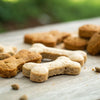Understanding Japanese Chin Health Problems: A Comprehensive Guide for Pet Owners
- Houndsy
Table of Contents
- Introduction
- The Anatomy of a Japanese Chin: Understanding the Breed
- Common Health Problems in Japanese Chins
- Diet and Nutrition for Japanese Chins
- Practical Health Maintenance Tips
- Conclusion
- FAQ
Introduction
Did you know that over 80% of dogs will experience some form of dental disease by the time they reach two years of age? This startling statistic is just one of the many health concerns that can affect our beloved pets, particularly those in smaller breeds like the Japanese Chin. These charming little dogs, known for their affectionate nature and striking appearance, are not just companions; they also require vigilant care to ensure their well-being.
In this blog post, we will delve into the specific health problems commonly seen in Japanese Chins, their implications, and how we can best manage and prevent them. By the end of this post, you will have a well-rounded understanding of the health challenges this breed faces, empowering you to provide the best possible care for your furry friend.
We will explore the top health issues affecting Japanese Chins, including their unique anatomical features that predispose them to certain conditions, preventative measures, and practical tips for maintaining their health. As we journey through this topic, we encourage you to reflect on your own pet care practices and consider how you can adapt them to better suit the needs of your Japanese Chin.
Our main message is clear: understanding Japanese Chin health problems is crucial for any pet parent looking to enhance the quality of life for their canine companion. So let's get started!
The Anatomy of a Japanese Chin: Understanding the Breed
Before diving into specific health concerns, it’s essential to understand the unique characteristics of the Japanese Chin breed. This toy breed typically weighs between 4 to 9 pounds and stands about 8 to 11 inches tall. They have a distinctive flat face and large, expressive eyes that add to their charming demeanor. However, these features, while adorable, can also lead to various health issues.
Brachycephalic Features
Japanese Chins are classified as brachycephalic dogs, meaning they have short muzzles and flat faces. While this gives them their signature look, it can also lead to breathing difficulties due to their anatomical structure. Conditions like Brachycephalic Airway Syndrome (BAS) can cause snoring, snorting, and even severe respiratory distress, particularly in hot or humid weather.
Understanding these anatomical features helps us appreciate the importance of monitoring their health closely and recognizing any signs of distress early on.
Common Health Problems in Japanese Chins
While Japanese Chins are generally known for their loving nature and playful spirit, they are also predisposed to several health issues. Below, we cover some of the most common health problems faced by this breed.
1. Brachycephalic Airway Syndrome (BAS)
As mentioned earlier, BAS is a prevalent condition in brachycephalic breeds, including Japanese Chins. The symptoms may include:
- Snoring: Loud breathing during sleep.
- Gagging or coughing: Frequent gagging or coughing can indicate airway obstruction.
- Exercise intolerance: Difficulty breathing during physical activity may be evident.
Management and Prevention: It's crucial to avoid intense exercise during hot weather and to keep your Chin cool and hydrated. Regular vet check-ups can help monitor their respiratory health, and in severe cases, surgical interventions may be necessary.
2. Luxating Patella
This condition occurs when the kneecap dislocates from its normal position. Symptoms can include:
- Hopping or skipping: Your dog may suddenly lift a leg and skip for a few strides.
- Pain while walking: This may lead to reluctance to walk or play.
Management and Prevention: Regular vet evaluations can help detect luxating patella early on. A healthy weight can also alleviate pressure on the joints, and severe cases might require surgical correction.
3. Cataracts and Other Eye Conditions
Japanese Chins are prone to a variety of eye problems, including cataracts, entropion (where the eyelids roll inward), and distichiasis (extra eyelashes growing on the eyelid). Symptoms may include:
- Cloudy eyes: Visible cloudiness in the lens of the eye.
- Squinting or tearing: Indicating discomfort.
Management and Prevention: Regular eye exams by a veterinarian can help catch these conditions early. Surgical options are often available to correct more severe issues.
4. GM2 Gangliosidosis
This genetic condition is particularly concerning as it can severely impact a dog's quality of life. It leads to neurological deterioration and is usually fatal. Symptoms typically appear in young dogs, around 12 to 18 months of age, and can include:
- Incoordination: Difficulty walking or maintaining balance.
- Tremors: Shaking or tremors in the head or body.
Management and Prevention: Responsible breeding practices, including genetic testing, can help prevent the spread of this condition.
5. Heart Disease
Heart problems, particularly Myxomatous Mitral Valve Disease (MMVD), are common in older Japanese Chins. Symptoms might include:
- Coughing: Especially during or after exercise.
- Fatigue: Reduced energy levels and reluctance to engage in physical activity.
Management and Prevention: Regular vet check-ups and heart screenings can help monitor your dog's condition. Weight management and a balanced diet are essential for heart health.
6. Dental Disease
Dental health is crucial for all dogs, but particularly for small breeds like the Japanese Chin, which are more susceptible to dental issues. Symptoms may include:
- Bad breath: Indicative of underlying dental problems.
- Difficulty eating: Pain while chewing or reluctance to eat.
Management and Prevention: Regular teeth brushing, dental check-ups, and professional cleanings can help maintain oral health.
Diet and Nutrition for Japanese Chins
Feeding your Japanese Chin a healthy and balanced diet is a cornerstone of preventive health care. Here are some tips on how to best nourish your furry friend:
1. Choose High-Quality Dog Food
Look for dog food that meets the nutritional standards set by the Association of American Feed Control Officials (AAFCO). This ensures that the food has been rigorously tested and contains all necessary nutrients.
2. Monitor Portion Sizes
Given their small size, it's crucial to ensure that your Japanese Chin receives the right amount of food to prevent obesity. A general guideline is to feed them around 90% dog food and limit treats to no more than 10%.
3. Consider Age and Activity Level
Adjust your dog's diet based on their age and activity level. Puppies require higher calorie counts, while seniors may need fewer calories. Always consult your vet for personalized recommendations.
Practical Health Maintenance Tips
- Regular Vet Check-Ups: Schedule routine health checks to monitor for common breed-specific health issues.
- Dental Care: Brush your dog's teeth regularly and schedule dental cleanings as recommended by your vet.
- Weight Management: Keep your Japanese Chin at a healthy weight to reduce the risk of joint and heart issues.
- Hydration: Ensure your dog always has access to fresh water, especially in hot weather.
- Grooming: Regular grooming can help prevent skin issues and keep their coat healthy.
Conclusion
Understanding Japanese Chin health problems and their implications is vital for any pet owner dedicated to enhancing their dog's quality of life. By staying informed about the common health issues this breed faces, you can take proactive steps to ensure their well-being.
As we wrap up our exploration of Japanese Chin health, consider how you can incorporate these insights into your daily care routine. Regular vet visits, a balanced diet, and attentive grooming can go a long way in maintaining your dog's health.
If you're ready to elevate your pet care routine further, why not explore our Houndsy Kibble Dispenser? This innovative tool simplifies feeding while ensuring your pet receives the right portions every time.
FAQ
1. Are Japanese Chins prone to health problems?
Yes, Japanese Chins are predisposed to several health issues, including brachycephalic airway syndrome, luxating patella, and dental disease.
2. How can I maintain my Japanese Chin's health?
Regular vet check-ups, a balanced diet, dental care, and weight management are key to maintaining their health.
3. Can I prevent genetic diseases in my Japanese Chin?
Choosing a responsible breeder who conducts genetic testing can help reduce the risk of inheritable diseases.
4. How often should I feed my Japanese Chin?
Typically, it's recommended to feed small breeds like the Japanese Chin three times a day, adjusting portions based on age and activity level.
5. What are the signs of heart disease in Japanese Chins?
Common signs include coughing, lethargy, and exercise intolerance. Regular vet check-ups are essential for early detection.
By staying informed and proactive, we can ensure our Japanese Chins lead healthy and happy lives.













